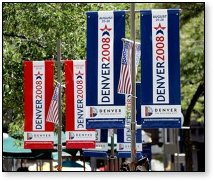 The Democrat National Convention of what many refer to as the "pro-abortion party of the United States" will take place within the Archdiocese of Denver from Saturday, August 23, with the official Welcoming Celebration, through Friday, August 29, 2008.
The Democrat National Convention of what many refer to as the "pro-abortion party of the United States" will take place within the Archdiocese of Denver from Saturday, August 23, with the official Welcoming Celebration, through Friday, August 29, 2008.
More than 50,000 persons, including Democrat Party elected politicians, party members, delegates, and media, are expected for the weeklong event at various venues throughout the city. Many of these visiting folks will be pro-abortion Catholics — or Catholics in name only. Ironically, the 'Freedom from Religion Foundation' is posting a billboard near the Convention Center that says, 'Keep Religion Out of Politics.'
Many are wondering if Archbishop Charles Chaput of the Archdiocese of Denver is prepared spiritually to take advantage of such a momentous teaching moment? Here's why.
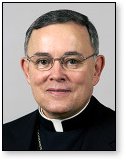 It's well known the Denver Archbishop has failed to say that he will implement Canon Law's canon 915, a clearly taught discipline against persons who obstinately persist in grave, manifest [public] sin, such as the murder of the unborn child and infanticide. This is a moral stand, not a political one.
It's well known the Denver Archbishop has failed to say that he will implement Canon Law's canon 915, a clearly taught discipline against persons who obstinately persist in grave, manifest [public] sin, such as the murder of the unborn child and infanticide. This is a moral stand, not a political one.
Let's take the Democrat Catholic governor of Colorado, Bill Ritter, for an example, who lives and works in the Denver area. Archbishop Chaput has warned him publicly for almost two years, has written columns denouncing Ritter's legislations, and I assume the Archbishop has written him personal catechetical appeals.
What is so morally offensive about Governor Bill Ritter that Archbishop Chaput should deny him Holy Communion? Let us look at Ritter's record to date.
 Shortly after taking office, Ritter restored state funding for Planned Parenthood of the Rocky Mountains, signed legislation that requires all Roman Catholic hospitals to distribute emergency contraception to rape survivors, and pledged that he will not seek to appoint judges who oppose abortion rights. To date, Ritter has no anti-abortion legislation on his agenda. Ritter also has made it clear that if Roe v. Wade were overturned, he would veto legislation that is 'too restrictive' against abortions in Colorado. Ritter also supports sodomite marriage. The Catholic Church condemns all of Ritter's above "right to life" beliefs.[1]
Shortly after taking office, Ritter restored state funding for Planned Parenthood of the Rocky Mountains, signed legislation that requires all Roman Catholic hospitals to distribute emergency contraception to rape survivors, and pledged that he will not seek to appoint judges who oppose abortion rights. To date, Ritter has no anti-abortion legislation on his agenda. Ritter also has made it clear that if Roe v. Wade were overturned, he would veto legislation that is 'too restrictive' against abortions in Colorado. Ritter also supports sodomite marriage. The Catholic Church condemns all of Ritter's above "right to life" beliefs.[1]
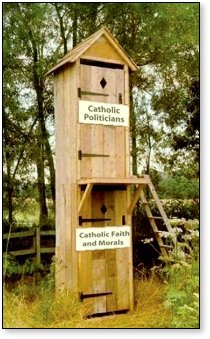 When a public pro-abortion person disregards a bishop's directive to stay away and comes to Holy Communion 'of his own volition,' and the Minister of the Eucharist gives the Host to such a person, the bishop is doing evil [CIC, n.1755] because he has not instructed his Ministers to deny. The Denver Archbishop refuses to walk the talk. [2] He failed to teach his flock that these persons must be denied Holy Communion.
When a public pro-abortion person disregards a bishop's directive to stay away and comes to Holy Communion 'of his own volition,' and the Minister of the Eucharist gives the Host to such a person, the bishop is doing evil [CIC, n.1755] because he has not instructed his Ministers to deny. The Denver Archbishop refuses to walk the talk. [2] He failed to teach his flock that these persons must be denied Holy Communion.
Sadly, Archbishop Chaput has indicated that it is the responsibility of the communicant to stay away from the Communion Rail. This is not correct. Rather, it is the responsibility of the Minister of the Eucharist to deny Holy Communion. This is a huge difference that goes against the Church's teachings [3] regarding canon 915 as well as recent statements from the Vatican stating that the manifest pro-abortion politicians must be denied, and the burden IS upon the Minister to deny, NOT upon the communicant to stay away.
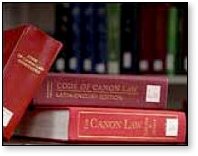 Canon Law also places the responsibility on the minister — 'ne admittantur' — who, in some canonists' opinion, could be punished themselves according to canon 1389 §2, should he unlawfully administer the sacrament with the consequent danger of scandal for the rest of the faithful. Canon 1339 prescribes the possibility of punishing any person who causes grave scandal by any violation of a divine or ecclesiastical law.
Canon Law also places the responsibility on the minister — 'ne admittantur' — who, in some canonists' opinion, could be punished themselves according to canon 1389 §2, should he unlawfully administer the sacrament with the consequent danger of scandal for the rest of the faithful. Canon 1339 prescribes the possibility of punishing any person who causes grave scandal by any violation of a divine or ecclesiastical law.
Therefore, if pro-abortion Democratic Speaker of the House Nancy Pelosi approaches the altar in Denver to receive the Eucharist, the Ministers of the Eucharist, including 'ordinary' and 'extra-ordinary,' [4] must deny Holy Communion themselves, regardless that their bishop has failed to instruct them to do so.
Archbishop Chaput in May of 2004 in his regular column for the Denver Catholic Register, wrote:
"The current media turmoil over "denying Catholic politicians Communion" is filled with ignorance about the Church and the real meaning of the Eucharist. Denying anyone Communion is a very grave matter. It should be reserved for extraordinary cases of public scandal. But the Church always expects Catholics who are living in serious sin or who deny the teachings of the Church — whether they're highly visible officials or anonymous parishioners — to have the integrity to respect both the Eucharist and the faithful, and to refrain from receiving Communion."
All right, Archbishop. What are you waiting for? Isn't murder [abortion] and sodomy grave enough and extraordinary enough to deny Holy Communion?
This is not a political decision, dear Archbishop, but a moral decision, for all times, not just for election times. It is not a sudden decision of piety, as you say in your column, but of concern for the eternal salvation of souls of persons who refuse to abandon their pro-abortion, pro-sodomite views. Abortion is murder and evil actions have consequences and a bishop is called to 'govern' and 'correct' using the discipline of canon 915.
If Archbishop Chaput' statement and action in regard to Governor Ritter is morally correct, this would mean that priests in the Denver Archdiocese, and everywhere else for that matter, should give Holy Communion without question to anyone approaching the Altar, to people publicly professing beliefs contrary to the doctrines of the Catholic Church or publicly living lives at serious variance with the teachings of the Church. This would include homosexual couples approaching the Eucharist arm and arm, the divorced and "remarried" without benefit of annulment, directors of Planned Parenthood, Mafia figures, drug lords, et al.
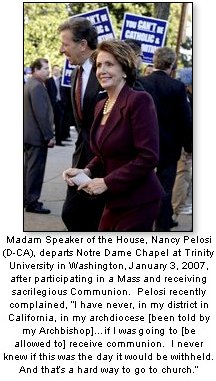 Let's ask this question of the Archbishop — if you were distributing Holy Communion and in front of you stood a known serial killer with a severed bloody head in one hand and a bloody machete in the other hand, would you give him the Eucharist? And after you denied the serial killer you next had standing before you the known pro-abortion politician Nancy Pelosi. Would you also deny her? Murder is murder, isn't it Archbishop?
Let's ask this question of the Archbishop — if you were distributing Holy Communion and in front of you stood a known serial killer with a severed bloody head in one hand and a bloody machete in the other hand, would you give him the Eucharist? And after you denied the serial killer you next had standing before you the known pro-abortion politician Nancy Pelosi. Would you also deny her? Murder is murder, isn't it Archbishop?
It is well for us to remember that in his memorandum entitled "Worthiness to Receive Holy Communion — General Principles," Cardinal Joseph Ratzinger, now Pope Benedict XVI, said without ambiguity:
"The minister of Holy Communion must refuse to distribute it" when warning and counsel given to the manifest sinner "have not had their effect." [5]
In contrast to Archbishop Chaput, 15 U.S. Archbishops and Bishops [6] have publicly stated that they would deny Holy Communion to such persons. Of this list of 15 Bishops, is included Bishop Michael Sheridan of Colorado Springs, Co. Does the disunited U.S. Conference of Catholic Bishops now teach that it is correct for Bishop Sheridan to deny Nancy Pelosi the Eucharist in his diocese while Archbishop Chaput, in his Archdiocese, just 75 minutes away, allows his ministers to give evil Nancy Pelosi the Eucharist?
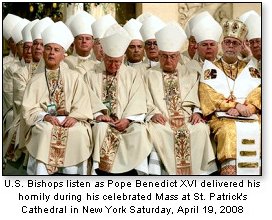 For some U.S. bishops to deny and other U.S. bishops not deny Holy Communion to pro-abortion politicians is a source of disunity and confusion for the entire universal Church and a grave scandal against the faithful worldwide.
For some U.S. bishops to deny and other U.S. bishops not deny Holy Communion to pro-abortion politicians is a source of disunity and confusion for the entire universal Church and a grave scandal against the faithful worldwide.
This leads the common observer to wonder why a group of 268 active U.S. bishops, including 25 Archbishops and 11 Cardinals, should even pretend to exist as a united Conference when they cannot agree on the most fundamental and crucial teaching of the Church, that abortion is murder. [7]
Recently, in the prestigious canon law journal, specifically the 2007 edition of the Pontificia Università Gregoriana Periodica De Re Canonica, volume 96, Archbishop Raymond L. Burke wrote an important essay entitled "The Discipline Regarding the Denial of Holy Communion to Those Obstinately Persevering in Manifest Grave Sin." In it, he suitably and accurately named three of the 253 active, obstinate bishops who refused to obey the Church's canon law c. 915. [8]
 Furthermore, on May 9, 2007, Pope Benedict reiterated lofty and long-held Church teachings at 35,000 feet above sea level while in flight to Brazil, agreeing with the Mexican bishops' recent warning of automatic 'tolerati' excommunication[9] or 'Latæ sententiæ' [10] for Catholic persons who supported, legislated, or promoted abortion [cf. formal accomplices, c.1329; cf. EV 62B]. Benedict said the teaching was, in fact, the law of the Church:
Furthermore, on May 9, 2007, Pope Benedict reiterated lofty and long-held Church teachings at 35,000 feet above sea level while in flight to Brazil, agreeing with the Mexican bishops' recent warning of automatic 'tolerati' excommunication[9] or 'Latæ sententiæ' [10] for Catholic persons who supported, legislated, or promoted abortion [cf. formal accomplices, c.1329; cf. EV 62B]. Benedict said the teaching was, in fact, the law of the Church:
"Yes, this excommunication was not an arbitrary one but is allowed by Canon Law [11] which says that the killing of an innocent child is incompatible with receiving Communion, which is receiving the Body of Christ. [The Mexican bishops] did nothing new, surprising, or arbitrary. They simply announced publicly what is contained in the law of the Church...which expresses our appreciation for life and that human individuality, human personality is present from the first moment...[Politicians who support abortion] will get the penalty of excommunication. This is not revenge, it is just what happens in the case of serious sins." [12]
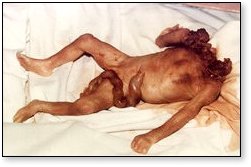 Pope Benedict and the Bishops who teach in union with the Pope speak loud and clear what the church's priorities are for voting as a Catholic. They teach that one may not consider other human conditions without giving first predominant consideration of the five most important conditions of the right to life: abortion, euthanasia, embryonic stem cell research, cloning and same-sex marriage.
Pope Benedict and the Bishops who teach in union with the Pope speak loud and clear what the church's priorities are for voting as a Catholic. They teach that one may not consider other human conditions without giving first predominant consideration of the five most important conditions of the right to life: abortion, euthanasia, embryonic stem cell research, cloning and same-sex marriage.
To send a note of encouragement to Archbishop Chaput to enforce canon 915, you may email him personally at: shepherd@archden.org.
NOTES:
[1] The Congregation for the Doctrine of the Faith's 'Doctrinal Note on some questions regarding the participation of Catholics in political life' 11/24/02 states in No.4: "John Paul II, continuing the constant teaching of the Church, has reiterated many times that those who are directly involved in lawmaking bodies have a 'grave and clear obligation to oppose' any law that attacks human life. For them, as for every Catholic, it is impossible to promote such laws or to vote for them"[Evangelium vitae, n.73].
[2] Shortly after the CDF's November, 2002 'Doctrinal Note' on Catholics in political life, in the Congregation of Divine Worship's December, 2002 Notitiae edition we read from its prefect Cardinal Estevez: "Another fundamental right of the faithful, as noted in Canon 213, is 'the right to receive assistance by the sacred Pastors from the spiritual goods of the Church, especially the word of God and the Sacraments.' In view of the law that 'sacred ministers may not deny the sacraments to those who opportunely ask for them, are properly disposed and are not prohibited by law from receiving them' (canon 843 ¶ 1), there should be no such refusal to any Catholic who presents himself for Holy Communion at Mass, except in cases presenting a danger of grave scandal to other believers arising out of the person's unrepented public sin or obstinate heresy or schism, publicly professed or declared."
[3] Pope John Paul II, in 'Ecclesia De Eucharistia' states that only the faithful who have confessed grave sins in the Sacrament of Penance may receive Holy Communion, and that those who "obstinately persist in manifest grave sin" must be denied Communion.
[4] This loss of the 'fullness of unity' in teaching means that most 'ordinary ministers of Holy Communion' [cardinals, bishops, priests, deacons] and EMHCs [laymen who are duly installed by the bishops as 'extraordinary ministers of Holy Communion'] are handing Jesus over to be crucified once again.
[5] Cardinal Ratzinger was referring to an earlier Vatican document, "Pontifical Council for Legislative Texts Declaration Holy Communion and Divorced, Civilly Remarried Catholics," nos. 3-4, 6/00.
[6] Revised 8/14/08: Archbishop Raymond L Burke, Bishop Emeritus, St. Louis; Bishop Fabian W. Bruskewitz, Lincoln NE; Bishop Joseph A. Galante, Camden, NJ; Bishop John M. Smith, Trenton, NJ; Bishop Michael Sheridan, Colorado Springs, CO; Bishop Robert F. Vasa, Baker, OR; Bishop Gerald Gettelfinger, Evansville, IN; Bishop Robert J. Baker, Birmingham, AL; Bishop Peter J. Jugis, Bishop, Charlotte, NC; Bishop Samuel Aquila, Fargo, ND; Bishop Thomas J. Olmsted, Phoenix, AZ; Bishop Paul S. Coakley, D.D., Salina, KS.
Retired Bishops:
Bishop Henry Rene Gracida, Bishop Emeritus, Corpus Christi, TX; Archbishop John F. Donoghue Archbishop, Atlanta, GA, Bishop John Y. Yanta, Bishop Emeritus, Amarillo, TX.
[7] Cf. endnote #4. Also, Pontius Pilate told Jesus that "It was your own people and the chief priests who have handed you over to me" [Jn. 18:35]. And Jesus responded to Pilate that "he who handed me over to you is guilty of the greater sin" [Jn. 19:11].
[8] Specifically Archbishop Burke named Cardinal Roger Mahony of Los Angeles [cf footnote n. 4 of Periodica De Re Canonica essay], Cardinal Theodore McCarrick [cf footnote n. 5 of same essay], the former Archbishop of Washington, D.C.; and McCarrick's successor, Archbishop Donald Wuerl.
[9] The excommunication affects all those who commit this crime with the knowledge of the penalty attached and thus includes those accomplices without whose help the crime would not have been committed [Canon 1329]. Any person who promotes, legislates, and supports abortion is clearly a formal accomplice. Clearly, U.S. Catholic politicians have been enlightened to the facts of excommunication by this time by their bishops and Catholic laity.
[10] 'Automatically without sentence.' A censure incurred by the very fact of committing a crime. This excommunication is inflicted by the perpetrator on himself...by his very act.
[11] Canon Law is law; it is not a suggestion. Canon Law 915 states: "Those upon whom the penalty of excommunication or interdict has been imposed or declared, and others who obstinately persist in manifest grave sin, are not to be admitted to Holy Communion." For a Catholic to vote for pro-abortion legislation is a "manifest grave sin." According to Code of Canon Law, a bishop has not only the right but also the duty to stop a grave sinner from committing sacrilege and scandal. Canon 1369 tells bishops: "A person is to be punished with a just penalty, who...gravely harms public morals...." The Church has an innate and proper right to coerce offending members by means of penal sanctions (canon 1311). Diocesan bishops as well as the Pope possess legislative power, and the Code of Canon Law (canons 1315 and 1318) expressly recognizes their right to enact laws for their dioceses.
[12] Excommunication is a "medicinal penalty" [Canon 1312]; it is fundamentally oriented toward bringing Catholics to repent of certain seriously wrong behaviors. Meant not as punishment, but rather to bring people to wake up to what they're doing and the seriousness of it. The Pope has the right, the obligation, and the duty to enforce the moral law, which is superior to all municipal, state, federal, or even international law.
© Barbara KralisThe views expressed by RenewAmerica columnists are their own and do not necessarily reflect the position of RenewAmerica or its affiliates.
